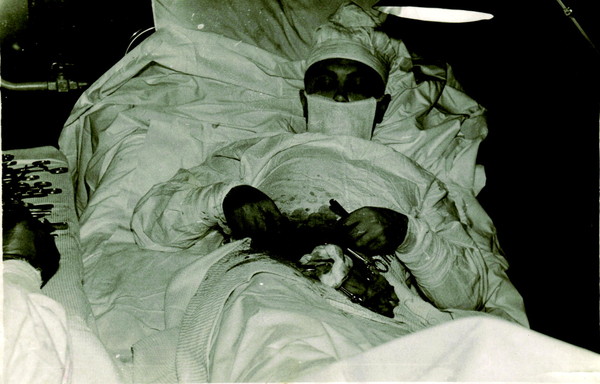Antarctica, 1961: A Soviet Surgeon Has to Remove His Own Appendix
This is the kind of DIY that you probably don’t want to try at home, especially if your home is in Antarctica.
If you think House and the guy who James Franco played in 127 Hours are tough, you haven’t heard of Leonid Rogozov.
In 1961, Rogozov was stationed at a newly constructed Russian base in Antarctica. The 12 men inside were cut off from the outside world by the polar winter by March of that year. In April, the 27-year-old Rogozov began to feel ill, very ill. His symptoms were classic: He had acute appendicitis. “He knew that if he was to survive he had to undergo an operation,” the British Medical Journal recounted. “But he was in the frontier conditions of a newly founded Antarctic colony on the brink of the polar night. Transportation was impossible. Flying was out of the question, because of the snowstorms. And there was one further problem: he was the only physician on the base.”
There was no question that he’d have to operate. The pain was intolerable and he knew he was getting worse. He recorded his thoughts in his journal:
I did not sleep at all last night. It hurts like the devil! A snowstorm whipping through my soul, wailing like a hundred jackals. Still no obvious symptoms that perforation is imminent, but an oppressive feeling of foreboding hangs over me … This is it … I have to think through the only possible way out: to operate on myself … It’s almost impossible … but I can’t just fold my arms and give up.
Operating mostly by feeling around, Rogozov worked for an hour and 45 minutes, cutting himself open and removing the appendix. The men he’d chosen as assistants watched as the “calm and focused” doctor completed the operation, resting every five minutes for a few seconds as he battled vertigo and weakness. He recalled the operation in a journal entry:
I worked without gloves. It was hard to see. The mirror helps, but it also hinders—after all, it’s showing things backwards. I work mainly by touch. The bleeding is quite heavy, but I take my time—I try to work surely. Opening the peritoneum, I injured the blind gut and had to sew it up. Suddenly it flashed through my mind: there are more injuries here and I didn’t notice them … I grow weaker and weaker, my head starts to spin. Every 4-5 minutes I rest for 20-25 seconds. Finally, here it is, the cursed appendage! With horror I notice the dark stain at its base. That means just a day longer and it would have burst and …
At the worst moment of removing the appendix I flagged: my heart seized up and noticeably slowed; my hands felt like rubber. Well, I thought, it’s going to end badly. And all that was left was removing the appendix … And then I realised that, basically, I was already saved.
Two weeks later, he was back on regular duty. He died at the age of 66 in St. Petersburg in 2000.
Just a little reminder that humans can complete some pretty amazing physical feats when their lives hang in the balance.
Update 4:25 p.m.: The article originally incorrectly stated Rogozov’s age at the time of his death.
Image: BMJ. Via BMJ and Regan Forrest.
